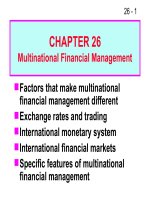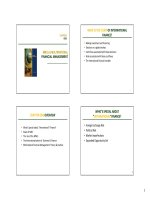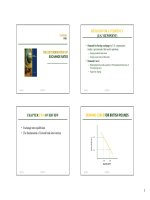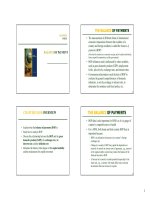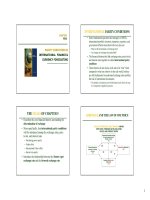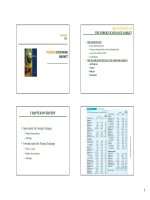Multinational financial management syllabus FIN505
Bạn đang xem bản rút gọn của tài liệu. Xem và tải ngay bản đầy đủ của tài liệu tại đây (80.42 KB, 13 trang )
INTERNATIONAL FINANCE
EC/FIN 505
Spring 2019
Instructor:
Dr. Nguyen Nhat Anh
Office:
AH
Phone:
(84)903456678
Office Hours:W, 6:30 pm – 7:30 pm or by appointment
E-mail:
Web page:
www.neu.edu.vn
Text:
Multinational Financial Management by Alan C. Shapiro, 7th edition.
Course Description and Objectives:
This course covers topics related to two general fields in international finance:
Open economy macroeconomics and financing the global firm. The former is
concerned with changes in global macroeconomic environment and includes
topics such as balance of payments, the linkages between exchange rates, interest
rates and good prices across countries, and key financial markets (foreign
exchange, futures, and options). The second part of the course deals with the
effects of the changes in the global macroeconomic environment on financing the
international firm. One such effect is the firm exposure (risk) that arises from
many sources, including changes in foreign exchange rates, interest rates, sociopolitical environment, and monetary and fiscal policies worldwide. The firm
needs adjust its capital structure and pricing strategy according to the changes in
the macro environment. These and related issues are covered in the second part of
the course.
International finance involves dynamic, exciting real-world events. My goal is to
make you be aware of and appreciate the importance of these events in conducting
business internationally. The longer-term benefit of this course will be the ability
to understand international financial news more effectively.
Since the material covered here is emphasized daily in the newspapers and other
media, a daily reading of the Wall Street Journal and the London Financial Times
would make as an excellent supplement to the text material. Special student rates
for subscriptions to these journals are available. If you are interested in, please see
me for further information and subscription fees.
Academic Ethics
Any form of academic dishonesty is strictly forbidden. This may include the
following: referring someone else’s work as your work without citing the full
reference for it or directly copying it down; using “cheat sheets” during exams;
and other forms of plagiarism. For further information what constitutes
plagiarism, consult your instructor or the Student Handbook. You should be aware
that plagiarism is often easy to recognize. The minimum penalty for any academic
dishonesty will be a score of zero on the assignment (exams and research paper)
where the dishonesty occurred.
Course Outline: Tentative Schedule
Chapter 1: Introduction
Chapter 2: Determination of Exchange Rates
Questions: 1-10.
Problems: 1-5.
Chapter 3: The International Monetary System
Questions: 1-10.
Problems: 1-5.
Chapter 4: Parity Conditions
Questions: 1-15.
Problems: 1-15.
Chapter 5: Balance of Payments
Questions: 1-10.
Problems: 1-5.
Chapter 6: Country Risk
Questions: 1-5.
Problems: 1-5.
Chapter 7: The Foreign Exchange Market
Questions: 1-4.
Problems: 1-10.
Chapter 8: Foreign Currency Options
Questions: 1-5.
Problems: 1-10.
Chapter 11: Foreign Exchange Exposure
Questions: 1-10.
Problems: 1-9.
Chapter 14: Cost of Capital for Foreign Investments
Questions: 1-10.
Problems: 1-10.
Chapter 16: Corporate Strategy and Foreign Direct Investment
Questions: 1-10.
Problems: 1-5.
Chapter 17: Capital Budgeting
Questions: 1-10.
Problems: 1-4.
Tentative Key Dates*:
Research Paper timetable: See below
Martin Luther King Jr. Holiday –Jan 17
Country Analysis Report due: Feb 16
Research Paper is due: April 25
Power Point Presentations: April 11, 18, and 25.
Final: May 2 (Monday) – 8:30-10:10 pm
Tentative midterm exam dates*:
Exam 1: Feb 21
Exam 2: April 4
*I reserve the right to change dates above.
Grading:
Two midterms (equally weighted)
40%
Comprehensive Final
Country analysis report*
Research paper
and presentation*
35%
10%
15%
* Team work: Peer review makes up 50 percent of your grade.
CLASS PARTICIPATION
Every student is expected to fully participate in class discussions. Besides regular
attendance, participation, both in quantity and quality, is critical. Students are
expected to download lecture notes before class and participate in lecture
discussions regularly. This may include direct questions directed to students
regarding lecture notes. Students will be called randomly to answer assigned
homework questions and/or solve problems on the board. Although homework
questions will not be collected in class, exam questions may include similar
questions and problems.
COUNTRY ANALYSIS REPORT
This is a group project. Students will select an emerging market and study its
economic and political environment in detail for the past 10 years or longer. This
report will serve as a background piece for the research paper assignment
discussed above. The report should be about 8-10 page long (font size 11 and
excluding tables, figures and references) and include indicators of economic
performance and the degree of political and social instability in the country. In
addition, major economic and financial crises, and political and governmental
changes need to be included. What are the major economic and political events?
Were there any regime changes or coalition governments? Who are the ruling
party, family or government? How often was there a change in government? Is the
country in financial trouble so that they have frequent IMF visits? Is there any
regional conflict like those in Indonesia (Timor, Irian and Aceh) and Turkey
(Kurdish region)?
The report should provide a good survey of economic and political environment of
the emerging market in the last decade or longer. All tables and figures should be
included at the end of the report as an appendix.
After the completion of the report, students should have a good idea about the
worthwhile news items regarding their emerging market.
Country Analysis report due:
February 14
Late reports will be penalized a letter grade for each day.
RESEARCH PAPER
Goal: To be familiar with emerging stock markets and to estimate the impact of
economic and political “news” on asset returns. This will allow students to
appreciate the importance of economic and political risk that are important for
asset price movements.
Note: This is a group project. No more than one graduate student is allowed per
group.
Activities:
Activity 1: Select an emerging market from one of the following: Brazil,
Colombia, Indonesia, Thailand, Korea, Bolivia, Russia, and India, Israel,
Nigeria.
You may choice another country if your group may have some expertise
on it.
Note: An emerging market cannot be studied by multi groups. Market
selection is based on a first-come first-served basis.
• Use current periodicals, newspapers, and the Internet information.
• Collect DAILY data on economic and political variables and relevant DAILY
STOCK prices for the past (minimum) 5 years or longer. Longer information
set will positively influence your grade.
• Depending upon your particular emerging market and country report on it, you
may use a combination of the following as indicators of ECONOMIC AND
POLITICAL NEWS:
-
Strikes and anti-government demonstrations
-
Conflicts between police and demonstrations
-
Election dates (local and general
-
Violence (deaths, injured people) due to terrorist activities, bombings, etc.,
riots
-
Appointments of new government officials, central bank presidents and finance
ministers
-
Government instability (coalition talks, number of coalition parties in office,
etc.)
-
IMF (International Monetary Fund) news, such as IMF help to the country,
including visits, delaying loans, negotiations, etc.
-
ECONOMIC VARIABLES: news about GDP, inflation, production, and other
economic news.
Note: This list is not exhaustive. Please construct variables that best represent your
emerging country’s economic and political situation.
Some useful sources of news:
/> (corruption)
(corruption)
Radio free for Europe (Russia)
(terrorism)
(terrorism)
(EXCELLENT SOURCE to
begin your research)
(election
dates)
For each event above, you need to list the date of a particular event and then
provide a brief description of the event. This must be turned in as a Microsoft
Word file.
A useful reference for emerging and world market stock prices data is:
/>(see the section on “World Markets: Major World Indices”)
Activity 2: Using the daily data set above, create a set of political risk and
economic events. To do so, use an excel sheet to create event dates for such
events. Insert a value of 1 when there is an event and zero otherwise.
Activity 3: Using the stock price DAILY data you collected over the past 5 years,
construct stock returns series as follows:
% Return = [log (stock price at time t)-log (stock price at time t-1)]*100,
which gives you the percentage change in the stock price, that is, percentage return
(gain).
Activity 4: To identify the impact of different economic and political news on
returns, run a regression by separately entering news variables. For example,
suppose we have two types of news: terrorist incidents and inflation news. Then
run the following:
(Return)t = α + β1 (terrorism)t + β2 (inflation)t + δ (World Return) t + et
where the variables takes a value of 1 on days of terrorist events or inflation news
and zero otherwise. A global index return, such as SP& 500, is included to capture
the impact of global developments on emerging market under investigation. Now
you are ready to interpret the meaning of estimated coefficients for β1 and β2.
Activity 5: Interpret results and discuss policy implications for policymakers and
lessons for investors/managers etc.,
ORGANIZATION OF THE PAPER BY SECTIONS: For full credit, the paper
should have the following order:
Section 1 – Introduction
Describe the emerging markets used, including indicators of the stock market
development over time for the past 5 years or longer. The typical indicators are
trading volume, number of trading companies, market capitalization,
price/earnings ratio, and dividend yield. Annual or quarterly data are sufficient.
Put the indicators in a Microsoft Word table format.
Section 2 – Description of News and Sample Period used
Provide a list of your specific news events and describe these news, say, violence,
(what kind of events included in each news, say, killings, suicide bombs, etc.?)
Section 3 – Estimated results and discussion
Provide estimates of your regression and discuss the results. Is political news more
significant than economic news as the determinants of returns? Among many
political risk variables you constructed (terrorist incidents, elections,
demonstrations, etc,), are there some variables more significant than others?
Section 4 – Conclusions
Conclude with policy implications of your results. Assuming that policy makers
believe that financial market (stock and foreign exchange) growth and stability is
engine of economic growth, what should policy makers do to improve the
development of the emerging stock market?
Section 5 – References
Include a list of your reference cited in the text and other scholarly publications
you cited in Section 3 above here.
Section 6– Figures (Plots)
Provide figures for the emerging market and world index in two formats: stock
price index (raw data as you collected) and returns (as computed above).
Section 7 – Graduate student work
Each graduate student will do extra work for the project. They will identify six
related studies in the literature and summarize how their work relates these
studies. A comparison of the results from these papers with the findings of the
research project is expected.
Section 8 -Disk copy
Provide a disk copy of the following:
1. An excel file that includes the raw stock price data and political and
economic news variables,
2. A Microsoft Word file, listing the dates and description of the events by
variable. At the end of each description, state or label the event such as
RIOTS, TERRORISM, etc.
3. A Word file for the entire paper, which includes the sections 1-6 above.
Timetable:
February 21 – Provide a disk copy of the raw stock price data (EMERGING
MARKET PLUS SP&5OO US INDEX)
April 4 – Turn in a disk copy of a list of DAILY political and economic news
variables, along with a brief description, created in an excel file. The file should
also include the separate news making up the index. Again, for each event that
occurs we put 1 for that date and zero otherwise.
April 25 – all research papers due.
Note: There will be a letter grade penalty for each day the assignments are
late.
April 11, 18 and 25– Power point presentations.
Fatal Error Policy: As business students, you must practice professional
standards in writing. To this end, all written assignments must meet minimal
standards to be acceptable. These standards address spelling, punctuation, format
and basic grammar. The term Fatal Errors refers to technical English errors and
errors of form. Specifically, Fatal Errors include the following:
1. Each different word misspelled
2. Each sentence fragment
3. Each run-on sentence or comma splice
4. Each mistake in capitalization
5. Each serious error in punctuation, which obscures meaning
6. Each error in verb tense or subject/verb agreement
7. Lack of conformity with assignment format
8. Each improper citation, or lack of citation where one is needed.
One way of avoiding some of these errors is to use the spelling and grammar
software available in the computer and writing labs. These software packages will
identify many (but not all) errors for you so that you may correct them. If you are
not sure how to correct them, seek advice from the staff in the Writing Center.
Information about the Writing Center is available on the course website. Papers
with more than three fatal errors marked by the instructor on any one page,
or more than ten in the entire document are unacceptable. The instructor will
stop reading when either figure is exceeded and will return the paper to the
student without a grade.
If an individual paper is returned to you because of Fatal Errors, you must
correct it and return it to the instructor by the next class meeting. Grades on
all papers that are returned because of Fatal Errors will be reduced by one
letter. It is, therefore, in your interest to use available help before you submit the
paper the first time. SIUE Writing Center provides free of charge services. A
paper that still has Fatal Errors after it is returned and resubmitted can receive a
grade no higher than a "D".



